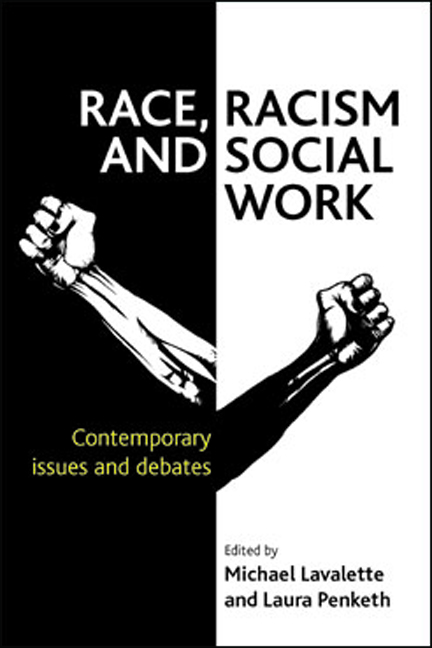Book contents
- Frontmatter
- Contents
- Notes on contributors
- Acknowledgements
- Dedication
- Some terms and definitions
- Introduction: Race, racism and social work
- one Rethinking anti-racist social work in a neoliberal age
- two The growth of xeno-racism and Islamophobia in Britain
- three The catalysers: ‘black’ professionals and the anti-racist movement
- four “Same, same, but different”
- five Antisemitism and anti-racist social work
- six Anti-Roma racism in Europe: past and recent perspectives
- seven In defence of multiculturalism?
- eight Social work and Islamophobia: identity formation among second and third generation Muslim women in north-west England
- nine Institutionalised Islamophobia and the ‘Prevent’ agenda: ‘winning hearts and minds’ or welfare as surveillance and control?
- ten ‘Street-grooming’, sexual abuse and Islamophobia: an anatomy of the Rochdale abuse scandal
- eleven My people?
- twelve Twenty-first century eugenics? A case study about the Merton Test
- thirteen The role of immigration policies in the exploitation of migrant care workers: an ethnographic exploration
- Conclusion: Race, racism and social work today: some concluding thoughts
- Bibliography
- Index
eleven - My people?
Published online by Cambridge University Press: 01 February 2022
- Frontmatter
- Contents
- Notes on contributors
- Acknowledgements
- Dedication
- Some terms and definitions
- Introduction: Race, racism and social work
- one Rethinking anti-racist social work in a neoliberal age
- two The growth of xeno-racism and Islamophobia in Britain
- three The catalysers: ‘black’ professionals and the anti-racist movement
- four “Same, same, but different”
- five Antisemitism and anti-racist social work
- six Anti-Roma racism in Europe: past and recent perspectives
- seven In defence of multiculturalism?
- eight Social work and Islamophobia: identity formation among second and third generation Muslim women in north-west England
- nine Institutionalised Islamophobia and the ‘Prevent’ agenda: ‘winning hearts and minds’ or welfare as surveillance and control?
- ten ‘Street-grooming’, sexual abuse and Islamophobia: an anatomy of the Rochdale abuse scandal
- eleven My people?
- twelve Twenty-first century eugenics? A case study about the Merton Test
- thirteen The role of immigration policies in the exploitation of migrant care workers: an ethnographic exploration
- Conclusion: Race, racism and social work today: some concluding thoughts
- Bibliography
- Index
Summary
As a result of austerity measures local councils across Britain are making a range of cuts to social and public services. These cuts are often deep – and raise questions about the viability of social work practice when there are few material resources available to meet people's needs. However, what if (or when) the cuts are disproportionately focused on projects working with minority communities – and justified because, unfortunately, these are not ‘our’ people? In this chapter Dave Stamp draws on his practice experience to look at the ways in which local councils are justifying cuts to services for minority communities – and asks what social workers should do when faced with such ‘racist cuts’.
Introduction
In October 2010, Birmingham City Council's cabinet member for Housing, John Lines, announced the local authority's proposal to stop providing housing and support for asylum seekers, noting that in ‘these difficult economic times … my people have got to come first’ (Bloxham 2010).
Lines’ words were an explicit articulation of a process of abjectification (Squire 2009) by which asylum seekers and other undocumented migrants are excluded from the mainstream of social welfare provision. This discourse constructs asylum seekers and other irregular migrants as ‘illegal’ – or, perhaps more accurately, as ‘illegals’, with the term becoming a noun by which those subject to immigration control are dehumanised and set apart from the rest of us. (Dauvergne 2008: 10). Quite bluntly, as the BBC reported in relation to the lives of people seeking asylum in Glasgow, ‘the Government says these people should not exist’ (Nye 2013). This chapter will seek to explore the implications of this imposition of illegality on both the lived experiences of those subject to immigration control, and on those professionals working to provide – or, increasingly, to deny – services and support to them. It will draw heavily on my own experience as a practitioner working in a small, grassroots voluntary sector agency advocating on behalf of asylum seekers and other undocumented migrants in Birmingham although the opinions voiced are my own and not necessarily those of the agency itself.
Leaving vulnerable people unable to meet their needs
One consequence of this discourse is that some thousands of refused asylum seekers are left destitute due to policies that seek effectively to starve them into agreeing to return ‘voluntarily’ to their countries of origin.
- Type
- Chapter
- Information
- Race, Racism and Social WorkContemporary Issues and Debates, pp. 205 - 222Publisher: Bristol University PressPrint publication year: 2013



